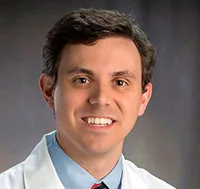The University of Wisconsin Carbone Cancer Center (UWCCC) has awarded Dr. Andrew Baschnagel its 2017 Young Investigator Award. Baschnagel is a radiation oncologist who specializes in treating patients with lung and other thoracic cancers. He joined the Cancer Center in 2014.
“I have a strong interest in doing translational research, so bridging the gap between the clinic and laboratory side of things and trying to move some of the laboratory ideas into clinic,” Baschnagel, an assistant professor of human oncology, said. “This award helps toward the ultimate goal, which is to improve patient care.”
With the pilot project award, Baschnagel plans to develop a mouse model of non-small cell lung cancer that has metastasized to the brain. He and other UWCCC researchers will use the animal model to test new drug and radiation therapies.

“Treatment options are limited for non-small cell lung cancer patients, and once they get diagnosed with brain metastases their prognosis is poor, typically a matter of months,” Baschnagel said. “I’m looking at finding new treatment options for these patients.”
One way cancer researchers test for potential new therapies is by developing animal models, where they implant mice with cancer cells that have either been growing in research labs for years and years, or were taken directly from a patient sample (known as patient-derived xenografts, or PDX).
As Baschnagel was looking to develop a mouse model of metastatic brain cancer, he was surprised to find that no commercially-available established cell lines existed, so he decided that PDX would be the best option. He enlisted the expertise of UWCCC and human oncology colleague Dr. Randy Kimple, who has successfully developed head and neck cancer PDX models.
“For this pilot project, we are working with surgeons and the Biobank to collect brain metastatic tissue from consented patients,” Baschnagel said. “Then that tissue is delivered to Dr. Kimple’s lab and is injected into the flank of mice, where it grows and thrives as a metastatic cancer.”
Baschnagel is also teaming up with UWCCC neurological surgeon Dr. John Kuo to inject the cells directly into mouse brains, an approach with which Kuo has found success in his glioblastoma research.
Once these models are developed, Baschnagel expects to tie them into some of his other research interests. He is currently performing genomic sequencing on healthy lung tissue, cancerous lung tissue and metastatic brain tissue from the same patient, and comparing the sequences to identify possible mutations that are linked to brain metastases.
“Whatever genomic signatures or biomarkers we find in that study, we can potentially validate in the mouse models and test if we can target it with a drug,” Baschnagel said. “In addition, because we don’t know who is going to get brain metastases, identifying those markers that can predict the development of brain metastases will greatly help in the management of these patients.”
The Carbone Cancer Center’s Young Investigator Award, which is co-supported by the Paul P. Carbone, MD, Memorial Foundation and the Carbone Cancer Center, is given to a junior faculty member whose proposed research and contributions to cancer research best embody the vision of its namesake, Paul P. Carbone. The Young Investigator Award provides funds to help the awardee start an interesting cancer research project they otherwise may not be able to.
“Dr. Carbone strongly believed in the importance of applying our research to our patients as quickly as possible,” said Dr. Howard Bailey, director of the Carbone Cancer Center. “Dr. Baschnagel and his research are great examples of an outstanding young researcher applying his research toward improving the cancer care of his patients.”
Previous recipients of the Carbone Young Investigator Award include Dr. Susan Pitt, assistant professor of endocrine surgery, in 2016, Dr. Dusty Deming, assistant professor of medicine, in 2015, and Dr. Amy Fowler, assistant professor of radiology, in 2014.